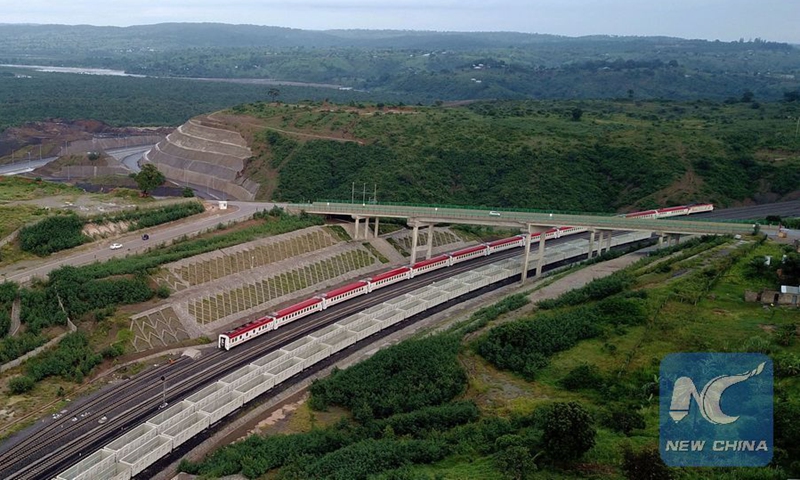
Aerial photo shows a train running on the Chinese-built Mombasa-Nairobi Standard Gauge Railway in Kenya. (Photo: Xinhua)
As the US-based international humanitarian system crumbles, the lid has been lifted to expose a troubling foreign aid policy built on politics, interference in domestic affairs and deliberate de-stabilization of democratically elected governments in Africa and elsewhere.
The myth of an apolitical Western humanitarianism and development aid based on the principles of neutrality, impartiality and non-interference in domestic affairs has been busted. Critics on the African continent say it is time to depoliticize aid amid growing dissatisfaction against the West due to evidence of interference.
Meanwhile, China's strong and unwavering policy of noninterference enables Africa to chart its own path and define its own sovereignty, a stance that has greatly endeared the Eastern nation to the African continent. Western aid is about building dominance in Africa, not democracy and development.
Africa receives billions of dollars in aid annually. But the continent is still yet to achieve sustainable economic development or even consolidated democracy. Education systems are crumbling even in some stronger economies. Approximately 438 million people still live below the extreme poverty line.
In contrast, there is no denying China's positive footprints in Africa, fast-tracking infrastructural development, which has sparked an economic renaissance on the continent. China is also on track to connect Africa to a network of critical trading routes through the China-proposed Belt and Road Initiative.
Western aid comes with strong political strings attached. China's ability to transcend political affiliations is its greatest strength and the foundation of its strong partnership and friendship with Africa. Post-colonial Africa is strongly opposed to any shades of neocolonialism. Even those that come heavily disguised as aid are indefensible.
In remarks that have generated significant support across the continent during an interview with an international media outlet last month, former African Union ambassador to the United States, Dr Arikana Chihombori-Quao said that humanitarian NGOs are not on the continent to help but to infiltrate and control African governments.
"They are using that open access, sounding humanitarian, to constantly destabilize governments. We need to understand the real reason why USAID is in Africa, and not just USAID, but other NGOs. They are coming in claiming that they're introducing grassroots initiatives that are going to help the people, and so they use that as a way to go into the most remote parts of Africa. When you look at it on paper, it all looks really good, but they're actually wolf in sheep's clothing." she said.
"If you think about it, their sole purpose, for example, filling in the gaps in healthcare and education, where is the change? Show me one country that USAID was in and education improved. Show me what country where USAID was in and healthcare improved?" she added.
There is a growing concern across the continent that both humanitarian aid meant for immediate needs to address diseases, disaster and conflict as well as development aid which goes into issues such as infrastructure is deeply political, and has been weaponized by Western countries to control, dominate and stabilize Africa.
That, as currently designed, foreign aid is doing Africa more harm than good because it was formulated to achieve ends that are in conflict with Africa's wellbeing. Moreover, it funds an agenda that causes internal friction and conflict, and also conflict among countries.
Western foreign aid systems as currently constituted to keep neocolonialism alive will not work as Africa now has options, and is emboldened to use these options alongside others in the Global South. This could well be the beginning of the end of neocolonialism.
The author is a Kenya-based journalist. opinion@globaltimes.com.cn




